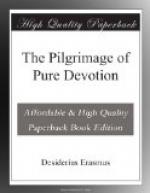of all sayntes thorowowt all the world. He after
that he had vysytyd many places, contrayes, and regyones,
at the laste came to Costantynenople. For Wylhelmes
brother was there byshope, whiche dyd make hym pry
to a certayne mayde, whiche had professyd chastyte,
that hadde parte of oure ladyes mylke, which were
an excedynge precyous relyque, if that other with
prayer, or monaye, or by any crafte it myghte be gotte.
For all the reliques that he hadde gotte before were
but tryfles to so holy mylke. Wyllyam wold not
rest there tyll that he had gotte halffe of that holy
mylke, but whan he had || it, he thoghte that he was
richer than Croeseus. Me. Why nat, but was
it nat withowt any goodhope? Ogy. He went tha
streght home, but in hys iornay he fell seke. Me.
Iesu there is nothynge in thys worlde that is other
permanent, or alwayes in good state. Ogy. But
whan he sawe & perceyuyd that he was in greate ioperdye
of his lyffe, he callyd to him a frenchman, whiche
was a very trusty companyon to hym in hys iornay.
And commaundyd all to auoyd the place, and make sylence,
& pryuyly dyd betake to hym thys mylke, apon this
condycyo, that if it chacyd to come home saffe & sownde
he wuld offre that precyous tresure to our ladyes
aultre in Paryse, whiche standythe in the myddys of
the ryuere Sequana, whiche dothe apere to separat
hymselffe to honor and obaye our blessyd lady.
But to make short tale. Wylyam is deade, & ||
C iij.|| buryed, the Frenchman mayd hym redy to departe
apon hys iornay, & sodely fell seke also. And
he in great dyspayre of amendynge, dyd commyth ye
mylke to an Englishma, but nat withowt great instance,
and moche prayer he dyd that whiche he was mouyd to
doo. Than dyed he. And ye other dyd take
the mylke, and put it apon an aultre of ye same place
the Chanones beynge present, whiche were yt as we
call Regulares. Thay be yet in the abbaye of
saynt Genofeffe. But ye Englishma obtaynyd the
halffe of that mylke, & caryed it to Walsynga in England,
the holy ghost put suche in hys mynde. Me.
By my trothe this is a godly tale. Ogy. But
lest there shuld be any doubte of this mater, ye Byshopes
whiche dyd grante pardon to it thayre names be wryten
there, as thay came to vysyte it, nat withowt thayre
offerynges, and thay haue || gyuen to it remyssyon,
as moche as thay had to gyue by thayre authorite.
Me. How moche is that? Ogy. Fowrty dayes.
Mene. Yee is there dayes in hell. Ogy.
Trewly ther is tyme. Ye but whan thay haue gratyd
all thayre stynte, thay haue no more to grante. Ogy.
That is nat so for whan one parte is gone another
dothe encrease, and it chansythe dyuersly euyn as
the tonne of Canaidus. For that althoghe it be
incontynently fyllyd, yet it is alway emptye:
and if thou be takynge owt of it, yet there is neuer
the lesse in the barell. Me. If thay grate
to an hunderithe thowsand me fowrty dayes of pardone,
wuld euery man haue elyke? Ogy. No doubte of




